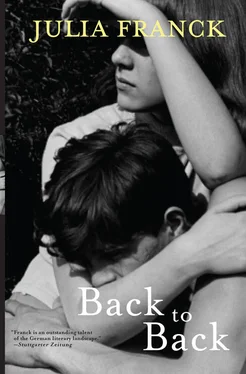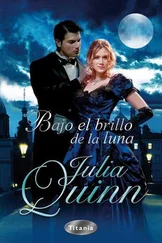Julia Franck - Back to Back
Здесь есть возможность читать онлайн «Julia Franck - Back to Back» весь текст электронной книги совершенно бесплатно (целиком полную версию без сокращений). В некоторых случаях можно слушать аудио, скачать через торрент в формате fb2 и присутствует краткое содержание. Год выпуска: 2013, Издательство: Grove Press, Жанр: Современная проза, на английском языке. Описание произведения, (предисловие) а так же отзывы посетителей доступны на портале библиотеки ЛибКат.
- Название:Back to Back
- Автор:
- Издательство:Grove Press
- Жанр:
- Год:2013
- ISBN:нет данных
- Рейтинг книги:3 / 5. Голосов: 1
-
Избранное:Добавить в избранное
- Отзывы:
-
Ваша оценка:
- 60
- 1
- 2
- 3
- 4
- 5
Back to Back: краткое содержание, описание и аннотация
Предлагаем к чтению аннотацию, описание, краткое содержание или предисловие (зависит от того, что написал сам автор книги «Back to Back»). Если вы не нашли необходимую информацию о книге — напишите в комментариях, мы постараемся отыскать её.
, was an international phenomenon, selling 850,000 copies in Germany alone and being published in thirty-five countries. Her newest work,
echoes the themes of
, telling a moving personal story set against the tragedies of twentieth-century Germany.
Back to Back Heartbreaking and shocking,
is a dark fairytale of East Germany, the story of a single family tragedy that reflects the greater tragedies of totalitarianism.
Back to Back — читать онлайн бесплатно полную книгу (весь текст) целиком
Ниже представлен текст книги, разбитый по страницам. Система сохранения места последней прочитанной страницы, позволяет с удобством читать онлайн бесплатно книгу «Back to Back», без необходимости каждый раз заново искать на чём Вы остановились. Поставьте закладку, и сможете в любой момент перейти на страницу, на которой закончили чтение.
Интервал:
Закладка:
They had trudged through the snow to their hotel room — hamboolabye fong fong. The bearded man had said he was going to the post office again to see if his parents had sent any money. He stood in the doorway and Käthe looked at him: Are you coming back? The bearded man could say whatever he wanted — was he to be trusted? The bearded man’s father, not a professor but an upright pastor in Halle on the River Saale, replied to say God be with his son. He could give his regards to the pastor of Bergalingen near Bad Säckingen, when he passed that way in the Hotzenwald district of the Black Forest. His call-up papers for the front had arrived and were urgent, said his father. Not a word by way of invitation to them, no money transfer, nothing about the woman who was trying to palm her coming child off on his son. Perhaps pregnant Käthe didn’t even exist in the mind of the pastor at Halle. God be with him, it sounded chilly. Yet the bearded man and his pregnant lover saw the message for the pastor of Bergalingen, the precise information conveyed by its geographical situation, and its proximity to Switzerland as a hidden sign that they might hope to find help there. Hip hip hooray!
Inside himself, Thomas stretched; his exterior maintained almost the attitude that Käthe wanted. He pressed his shoulder blades together, straightened his backbone. All that standing in front of Käthe’s eyes hurt; when he thought of Bellinzona, Thomas felt like bursting into tears. She had told him about it only once, as a result of that motorbike breakdown and their nocturnal walk, and she had told him about it with her usual rock-hard cheerfulness. But there was a glitter in her eyes, something was tipping over and cracking deep inside her. He wanted to hug Käthe. He had tried several times, but to this day she always just stood there like a chunk of wood. She was strong. He admired the way she set her chisel to the stone, carved her stone, and never complained on her own account.
Käthe put her tools on the wooden table and stretched her arms, she was jubilant, she yawned and straightened her back. Working on stone might be strenuous, but it made her happy. Käthe’s rosy cheeks were glowing like a girl’s, her cry of glee was the shout of a child.
Thomas smiled at her, but Käthe didn’t seem to notice his smile. She shook the stiffness out of her arms and hands and cleared her throat noisily, in a way that Thomas had only ever heard otherwise from men in company. He tried to imagine what she must have looked like back then, a young woman with a big belly. Käthe picked up her chisel, took the wooden smoothing tool and shaved tiny pieces of stone off the head.
Ella wanted to go away, leave home, have a place of her own, a room of her own. She had taken Thomas into her confidence. The lodger lay in wait for her as soon as he came to Berlin. He had pestered her in bed at night, he had taken her by surprise in the bathroom, he had followed her through the woods from the house towards the suburban railway station and tried molesting her there, until luckily some people out walking came along the path. If only to get away from the lodger, Ella had to move out. Thomas was going to help her find a place. He would be left alone with the lodger’s avid desires. He might be able to cope with that, he hoped he could put up with it. The lodger had made advances to him as well; there had been just the two of them in the house that afternoon, the lodger and Thomas. They could have a nice time together, the lodger had said excitedly. First he had talked to Thomas, then he touched him.
The smoothing sound died away. Käthe was inspecting her stone. Johann Strauss’s ‘Persian March’ was playing on the radio now. Thomas feared it; it was music that chased and tormented you. All the merriment it was supposed to contain, the daring, the triumph, attacked him, challenged him and made him feel weak. Undisturbed, Käthe went on pecking at the stone. In spite of the announcement that the violin concerto in D major in three movements by Brahms was to be heard over the next three-quarters of an hour, played by a certain Henryk Szeryng, there was a long silence after the woman announcer’s voice stopped, with only crackling noises, then a swelling rushing sound, and just as Thomas thought he could make out musical intervals in it, the music abruptly stopped and gave way to soft crackling. Thomas froze. For a moment Käthe stopped what she was doing; she didn’t like to miss the opening of a piece of music. The first deep notes on the strings sounded. Käthe put her tools down and drank some of her tea, took a couple of steps towards her stone and examined the rough shape of the elbow. Thomas felt as if he were seeing through her eyes and knew exactly what she was thinking. Something was wrong about it; the angle wasn’t sharp enough yet. The violin was playing in the foreground. Käthe did not often put her head on one side while she closed her eyes. She swayed, she didn’t dance but almost imperceptibly her body bent and stretched, she was melting. Dada, dadi, she murmured, singing along with the melody on the violin. Only her voice and the instrument existed, no stone, no Thomas, no one and nothing to whom she wanted to show her attitude and speak her mind. Thomas had never seen her like this before. Wonderful, Käthe purred and opened her eyes, her gleaming eyes. What music! She stood close to her stone and inspected it; she ran her short, strong hands over the rough curve and stepped back to pick up her chisel and peening anvil again. She worked on the elbow with short, fast taps. Thomas’s glance went to the window looking out into the yard; he heard voices there, footsteps, then he saw two figures on the other side of the window. Someone opened the small door into the studio.
A stocky, short man with red hair and a moustache, and a man with dark, curly hair marched into the studio. Thomas recognised the curly-haired man; he was a sculptor like Käthe, a sculptor from Leipzig.
Käthe beamed, she pushed up her goggles and put the peening tool down. Rüdiger, so you’re still around! She put out her arm, and she and the curly-haired man shook hands.
And this is Wiegand, said Rüdiger. Käthe greeted the redhead too.
A comrade and a colleague, added Wiegand. Käthe’s eyes were shining. There was a military sound to the clap of their hands as they met.
We thought we’d look in and talk about the competition. That bunch haven’t a clue.
Käthe nodded, and her smile turned to fiery earnest. We must work out a good idea, nothing will come of nothing. We must get the announcement right first.
Thomas was looking at his gooseflesh, a thousand tiny hairs standing proud in the light.
Rüdiger looked around him. Are you working on much just now?
Oh, this and that. Emerging from her throat, Käthe’s voice was a harsh rasp. I don’t have much here at the moment. I finished the relief for the hospital in the summer. Her voice rasped again; it sounded as if there was something in her throat. After that, just messing about, plaster and clay models. I’ve been waiting four months for this block of stone. Now it’s here and my stonemason has been sent on holiday. In the middle of November. Käthe laid her hand on the stone she had been working on just now. Her face brightened, her voice softened. A lovely stone, look, no great inclusions, not much dark veining. I already have a title: The Upright Man.
Thomas realised that his fingernails were between his teeth again; they made gratifying snapping sounds. He heard the three sculptors chattering as if they were birds twittering, again and again one voice would be raised, it was positively rhythmic, they were eager, sarcastic, rebellious. The voices grew louder and louder; they were deploring the ignorance of the ministers and leaders of the artistic associations. The yapping was like that of Thomas’s fellow students at school recently, complaining of their parents and present conditions. A pointless undertaking in both cases, it seemed to Thomas. Talking themselves into dependency and compliance, not out of it. Soongalaroo, varon te mai. Inventing words seemed to him a suitable reaction, something new and unique, a game against blind faith, the individual could and must move something in our society, they were saying, every individual was responsible for our democracy. Zumplepumple rumpledidum. Yet all eyes were blindly closed. How pitifully powerless talk and wishes were. The state had decided against the individual long ago. No one was waiting to hear about Rüdiger’s answer based on artistic principles, or Käthe’s love of Michelangelo and her commitment to the workers; conversations like these were pure boastfulness, blowing bubbles. All one class! Thomas saw the glitter of their words, which were shimmering in all colours of the rainbow. They didn’t need much light, the froth of what they were saying moved through the room in tiny flakes. A huge bubble, first the size of a breast, then as big as her head had come away from Käthe’s mouth, it was rising in the air, ooh and aah, said the marvelling mouths. Käthe was hardly ever happy, but she was proud. Her words tumbled over each other. Her pride sparkled, making the bubble shine more and more fantastically. Was she at one with her bubble? Did Rüdiger recognise its dazzling deception? Or was Thomas getting a distorted view of her through the curve of the bubble? Her nose was bending and growing, it looked enormous, the dark down on her upper lip vibrated under it, her full lips pouted, defiant and insinuating. Thomas laughed quietly to himself. The louder the froth and bubbles of the talk between Käthe and her friends, the more easily they thought they could recognise the signs of the times, identify the real news, and keep their eyes open for what had been going on over the last few years in this German Democratic Republic. Well, something was going to happen in the next few years, and they wanted to bring their influence to bear on the opportunity offered by this competition.
Читать дальшеИнтервал:
Закладка:
Похожие книги на «Back to Back»
Представляем Вашему вниманию похожие книги на «Back to Back» списком для выбора. Мы отобрали схожую по названию и смыслу литературу в надежде предоставить читателям больше вариантов отыскать новые, интересные, ещё непрочитанные произведения.
Обсуждение, отзывы о книге «Back to Back» и просто собственные мнения читателей. Оставьте ваши комментарии, напишите, что Вы думаете о произведении, его смысле или главных героях. Укажите что конкретно понравилось, а что нет, и почему Вы так считаете.












